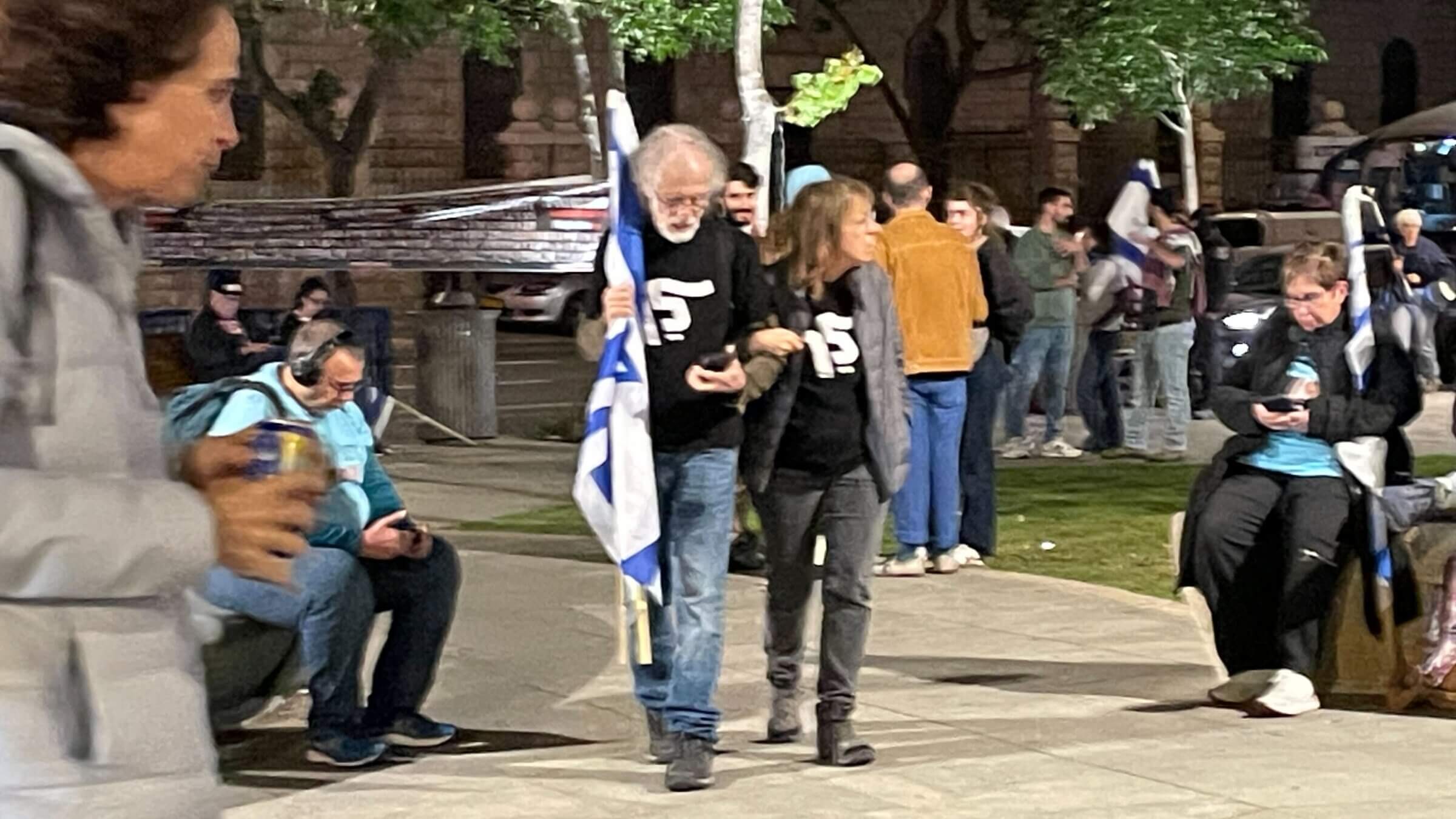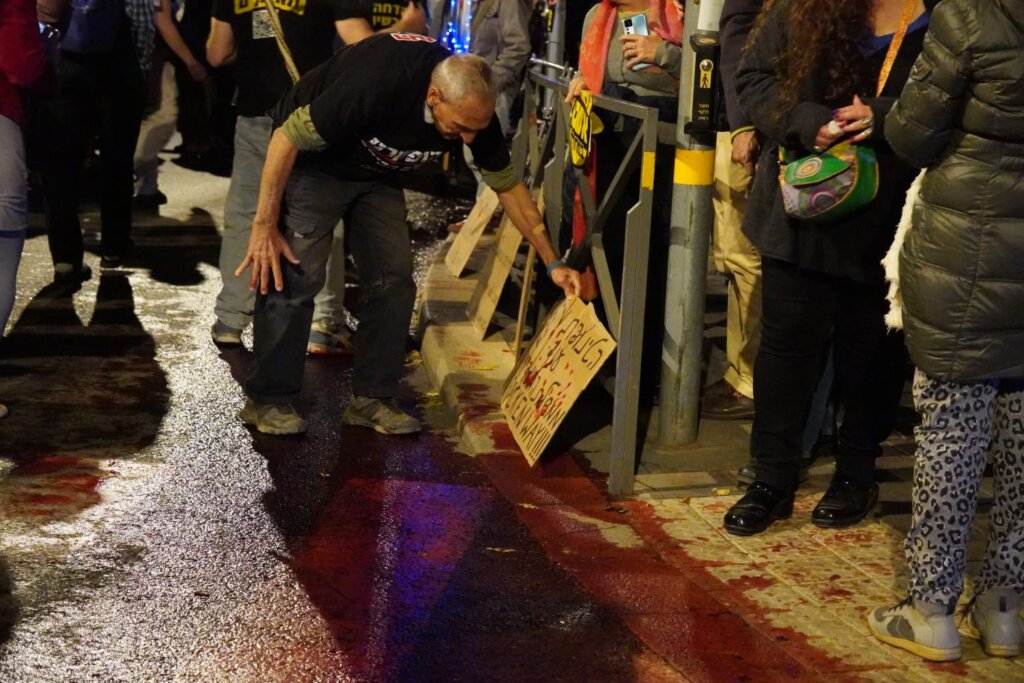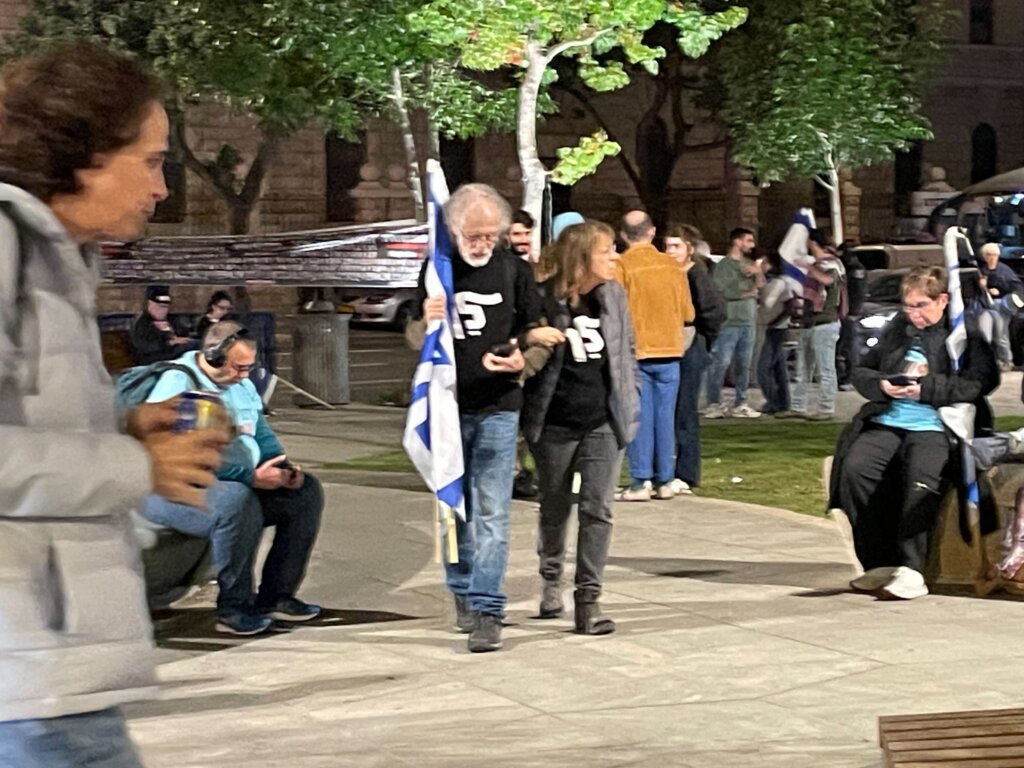Massive Israeli rally for hostages — and different views on how long Netanyahu should lead
Some who don’t want him to stay in power said he shouldn’t leave before the hostages are all home

Dani and Miriam Shmulevitz, protesting against Israeli Prime Minister Benjamin Netanyahu in Jerusalem on Nov. 25, 2023. Photo by Jacob Kornbluh
JERUSALEM — More than 100,000 Israelis gathered in the streets of Tel Aviv Saturday night to mark “50 days of hell” — the number of days Hamas attack Israel and took scores of hostages to Gaza — and call for the release of all hostages. The event took place as Israel anticipated the release of a second group of hostages — delayed until midnight local time. Seventeen — 13 Israeli and four foreign nationals — were released late Saturday.
“Returning hostages is the biggest mitzvah there is,” Israeli singer Ehud Banai told the crowd. “No victory until the last hostage,” read a large banner displayed at the rally. Since Friday, 26 Israelis and 16 foreign nationals have been released from captivity.

In a smaller gathering in Jerusalem, attendees expressed solidarity for those still held by Hamas in Gaza and prayed for their release.
Organized by the Shomrim Al HaBayit HaMeshutaf movement (which translates to “Safeguarding Our Common Home”), which before Oct. 7 worked to thwart the government’s judicial overhaul, the rally drew attendees from various backgrounds, including some who had participated in a nearby protest demanding the resignation of Prime Minister Benjamin Netanyahu. Some protesters displayed a “blood on his hands” installation outside Netanyahu’s residence on Aza Street.
Tzvi Dinur, 73, a regular attendee of the protests outside Netanyahu’s residence in past years, and a reservist during the Yom Kippur War, said he is hopeful that Israelis realize the need to change the country’s leadership as soon as possible. “Netanyahu is too dangerous to stay in power,” he said. His daughter Maya said she doesn’t trust Netanyahu to handle the war against Hamas.
Sitting on a bench nearby, wearing black t-shirts with the Hebrew word “lech” (go), Dani and Miriam Shmulevitz, said they expect the Israeli Knesset to vote no confidence in the prime minister so that a new government could lead Israel through what may be a prolonged war.

“Netanyahu is engaged in saving himself right now,” Dani said. “Whatever he is doing right now, we simply can’t trust his judgment.”
The Shmulevitzs said they are encouraged by the results of recent public opinion polls that show Netanyahu’s Likud Party holding less than 20 seats in an election.
Don’t swap horses midstream?
But Guy Schwartz, co-founder of the Jerusalem movement, which was launched early this year as protests against the judicial overhaul began, said calls for Netanyahu’s ouster should be deferred until the war concludes. “What we are doing tonight is to give people a space to gather to express their mixed pain and hope,” he said. “And at some point, when the war is over, I am certain that a call for worthy leadership will come.”
Schwartz said the key part of the rebuilding efforts in the wake of the Oct. 7 attack on southern Israel is unity around common interests, rather than division over what sets apart the Israeli public, and a “new leadership that will know how to stir the ship in the stormy waters with the goal of building consensus.”
Idit Wagner, who was accompanied by a family member who requested not to be named, echoed that sentiment. “There is a time for everything,” she said. Wagner had attended protests against Netanyahu in the past, but said she didn’t attend tonight’s demonstration because the focus should now be on releasing the hostages and defeating Hamas.
But rally participants were unanimous in their conviction agreement that the recent hostage deal with Hamas was the right course of action. They acknowledged the psychological strain caused by Hamas’s intermittent releases of hostages in small groups, and noted the delays in the actual handing over of the captives. Yet they support a negotiated resolution to the hostage crisis.
“We can settle our score with Hamas in a month or two months or a year from now,” said Dinur, a resident of the Givat Ze’ev Israeli settlement in northern Jerusalem. “Releasing every person from captivity is the most important task.”















